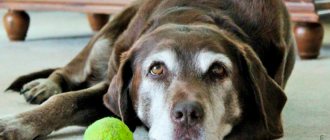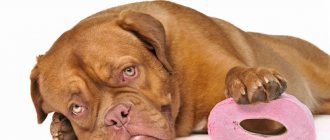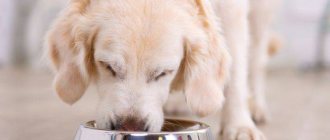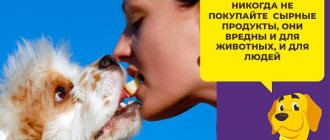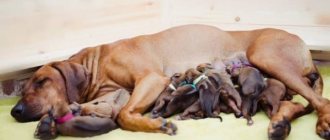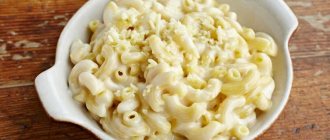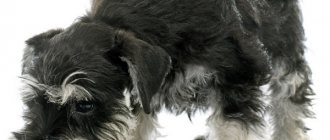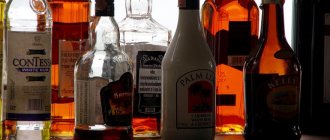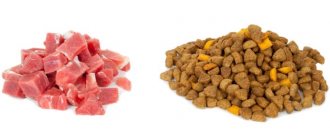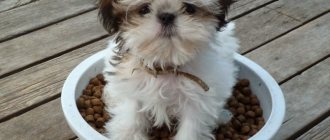Poisoning in dogs is a very serious problem; every dog owner has encountered it at least once in their life. The main cause of poisoning is that the dog, following its intuition, looks for food on the street. And the food waste that a dog can find near trash cans or under the windows of multi-story buildings can hardly be called safe. If the owner does not take care of his pet, the dog is poisoned, treatment and rehabilitation will be long . At this time, it is very important to know what to feed your dog after poisoning.
What can poison a dog?
The stomach of purebred dogs is very sensitive, so even food familiar to humans can lead to food poisoning. Dogs cannot tolerate fragrances, dyes and other chemicals. It is necessary to prepare food for your dog only from high-quality products, since expired ingredients lead to severe poisoning.
The owner needs to know exactly what to feed his four-legged friend. In addition to food poisoning, there may be poisoning from medications, poisons, acids, alkalis and poisonous plants - these cases should only be treated by a veterinarian. After your pet recovers, the doctor will give recommendations regarding treatment, feeding and care.
Causes of vomiting undigested food
Vomiting of undigested food does not always indicate the presence of some serious pathologies or abnormalities. A dog vomits after eating undigested food for a number of reasons:
- When eating, the animal swallows large pieces that have not been chewed. This often happens with hungry dogs who do not receive food according to schedule and there are no restrictions on the amount eaten.
- Grass got into the stomach.
- The diet includes low-quality feed, which contains ash, synthetic fillers, and flavoring additives.
- Nausea is caused by the need to feed the offspring. This is observed in bitches who have recently had puppies. They regurgitate some of the food, not all at once. Similar symptoms are not a deviation or a serious illness. If the dog does not lose weight, then such actions can be ignored.
- Pregnancy.
- The animal is taking potent medications.
- The dog was transported in a car or other vehicle and became seasick.
- Another reason is a change in food. The pet shows interest in food, but after eating it, vomiting begins. In this case, it is recommended to make a slow transition to a new food, giving it in portions. If the problem does not go away after some time, then it is best to return to the old diet. You shouldn’t rule out the possibility of a food allergy, which can cause your pet to vomit.
- Stress experienced due to moving to a new place, conflict with household members, attack by another animal.
- Getting heatstroke.
- Presence of hunger. In such situations, the dog vomits to get rid of stomach acid. This problem can be easily solved – just adjust the pet’s diet.
- Strong physical exertion, nausea occurs two hours after eating.
All of the above factors lead to vomiting. However, it does not repeat itself. Don't worry if the nausea goes away quickly and your pet feels well and is as active as before. The optimal solution is to observe the animal for some time. If the gag reflex does not go away or the condition worsens, contact your veterinarian immediately.
Serious problems why a dog vomits after eating include:
- An infectious disease that affects internal organs.
- A foreign body has entered the animal's stomach. It's a small stone, grass, a button, a piece of bone. As a result, nausea occurs 1-1.5 hours after eating.
- Acute poisoning. This can be caused by low-quality products, medications or chemicals.
- The most common cause is worms.
- Chronic problems associated with the gastrointestinal tract. Vomiting occurs when the disease worsens.
All this is accompanied by a number of symptoms. For example, if a pet has a serious pathology, vomiting does not stop, body temperature increases, weakness appears, interest in communication and games disappears, and diarrhea begins.
Attention! It is recommended to consult a doctor immediately. He will conduct an examination, identify the cause of the disease and prescribe further treatment.
Why is a diet necessary after poisoning?
In case of severe poisoning, the mucous layers of the gastrointestinal system are injured, and the functioning of the pancreas and liver is disrupted . During therapeutic fasting, toxins, which are decay products, are actively removed from the bloodstream, and all membranes heal intensively at this time. In addition, an inflamed liver does not participate in the digestion of food, which means it fully fights toxins and inflammation. During therapeutic fasting, the four-legged friend is given a lot of clean water to drink and sorbents prescribed by the doctor.
During the day after diarrhea and vomiting, a starvation diet is indicated.
Organ damage due to poisoning
A dog can get poisoned at any time. As a rule, dogs are indiscriminate and try to “taste” everything they come across on a walk or at home. This may cause symptoms of food poisoning. In this case, such phenomena as dysfunction of the stomach and intestines are possible, the functioning of the digestive organs, liver and kidneys, and pancreas is disrupted.
Vomiting and diarrhea accompanying poisoning lead to dehydration of the body, which in turn leads to disruption of the functioning of the heart muscle - the myocardium.
If a dog is poisoned, then rehabilitation measures should be aimed at restoring the functioning of the digestive organs, replenishing fluid lost after vomiting, and detoxifying the dog’s body. During a fasting diet, in the first one or two days, toxins are more intensively removed from the body, the liver actively fights decay products, not paying attention to the digestion of food, and the mucous membrane is restored.
So what should you feed your dog after poisoning? Nothing on the first day. You can only give water or strong tea if the animal drinks on its own.
Food on the first day after poisoning
A day after the active phase of poisoning, they begin to slowly feed the dog. The first food should be light so that the stomach can easily process it. The list of products for the rehabilitation period may be as follows:
- Second broths - the meat is allowed to boil, then the water is drained and clean water is poured in. This broth is less fatty and rich;
- Vegetable decoctions - beets and carrots are peeled and boiled over low heat, then allowed to brew;
- Viscous porridges - cereals are boiled in a large volume of water until completely cooked. You can use chopped cereal;
- Low-fat minced meat - chicken breast, veal or lean beef are suitable.
that enters the stomach and intestines must be quickly processed and not create a stagnant environment. At this moment, the stomach and intestines are very vulnerable, enzyme production is not yet at normal levels, and the liver cannot cope with the huge volume of nutritional components.
How to help
If the animal constantly gets motion sickness or you are sure that this will happen, it is recommended to use Serenia. The drug is purchased at a veterinary pharmacy.
All medications are prescribed by a specialist. Conventionally, they are divided into several groups:
- The first category includes agents that stimulate peristalsis. Food moves quickly through the intestines, and the likelihood of vomiting is excluded. These medications are good for dogs prone to nausea.
- The second group includes drugs that affect the brain center. Thanks to its use, gag reflexes are suppressed.
It is recommended that you take your dog to an appointment with a veterinarian as soon as possible or call one to your home.
Diet for dogs
Light food for dogs is fundamentally different from standard human food, since these animals are carnivores. So what can you feed your pet if it is poisoned so that the food is completely absorbed? The list of allowed products looks like this:
- meat - veal, horse meat, lean beef;
- lean boneless chicken;
- viscous porridge in low-fat broth - from buckwheat, rice and oatmeal.
After a couple of days, the following products are added to the dog’s diet:
- chicken eggs - fresh or boiled:
- low-fat cottage cheese;
- liver – preferably beef;
- boiled sea fish;
- boiled vegetables - carrots, beets;
- butter in limited quantities.
Meat and fish are ground in a meat grinder or blender and boiled in a steam bath . It should look like a meat pate. Chicken protein is more easily processed by the stomach when cooked, but the yolk is added to food raw, but only if you are confident in the high quality of the eggs. The same can be said about the liver; when it is fresh and not infected with parasites, it is offered raw, otherwise it is well boiled. Porridge can be cooked in vegetable broth - this makes the food more balanced and nutritious.
They begin to include butter in food in limited quantities, and other fats are completely removed from the dog’s diet for a while. In small volumes, various raw foods are given that promote the separation of gastric juice, increase beneficial flora and improve intestinal motility.
Veterinarians do not recommend including porridge made from semolina, millet, barley and pearl barley into a dog’s diet after poisoning . They are all heavy and difficult to process. However, if your four-legged friend loves such cereals, then they can be mixed with light cereals in equal proportions.
To improve intestinal motility, if stool is abnormal, the dog is given a little freshly squeezed carrot juice.
Diet after poisoning
After eliminating the symptoms of poisoning, the animal should be carefully and gradually transferred to normal nutrition . After a couple of days, try giving the dog a decoction of herbs and meat broth. If the broth turns out to be rich and fatty, it is better to dilute it with boiled water. This will make it easier for the stomach and liver to cope with digestion.
For diarrhea, it is good to give rice water. To do this, a handful of washed rice is digested until soft. Next, this decoction, which has a consistency similar to jelly, is soldered to the dog. You can cook starch jelly in water. This will protect the mucous membrane and promote its speedy recovery.
As the dog recovers, you can feed it raw beef, horse meat or veal. The meat should be lean, cut into small small pieces.
Small dogs and puppies can be fed with a scraper: pour boiling water over them and scrape the meat along the grain with a knife. The scrape is easily digestible, does not burden the stomach and is quickly digested. This is one of the best options than feeding a puppy after an illness.
It is better to serve chicken meat boiled and always without bones! If the animal's appetite gradually returns, you can introduce oatmeal or rice porridge with finely chopped meat into the diet. From vegetables you can add boiled carrots and beets.
After some time, you can add boiled sea fish, raw chicken eggs, beef liver, and low-fat cottage cheese to your diet. Liver is more useful in its raw form. Before feeding it to the dog, you should pour boiling water over it several times. You should not get carried away with raw eggs. Protein has an enveloping effect on the mucous membrane, but it is not recommended to give the egg itself more than once every 7-10 days.
As a source of fat, you can give butter little by little, adding it to porridge. In the first month, the dog needs plenty of fluids. There should always be fresh water in the bowl, where it is recommended to add a decoction of chamomile or St. John's wort in small quantities so as not to change the taste of the water.
Feeding regimen for poisoning
In case of poisoning, it is important not only to feed the dog the right foods, but also to follow a certain regimen:
- It is advisable to start feeding the dog four to five times a day , just like puppies are fed. Food should be given fractionally and in small portions.
- It is necessary to wait at least two hours between feedings so that the food has time to be completely digested.
- If the dog has never suffered from overeating, then he can easily set his own feeding schedule.
- After feeding, the remainder of the prepared food should be stored in the cold, and the required portion should be heated before the next meal.
- All dog dishes require a little salt; salt is a source of minerals.
- Clean water should be poured into a deep bowl and placed in a visible place.
The correct diet for dogs is calculated as follows: two parts - meat products, one part - vegetables and cereals. You need to feed the puppy and the puppy dog differently - three parts meat and one part vegetables and cereals.
As your pet recovers, you can return to the usual two meals a day. On the recommendation of a veterinarian, sorbents and probiotics can be given for some time to restore normal intestinal flora . Probiotics can be purchased at a pharmacy at a veterinary hospital, but medications for humans are also quite suitable. Instead of a probiotic, you can offer your dog low-fat bifidokefir, which is 2-3 days old; fresh kefir can greatly weaken and irritate the intestines.
Causes of diarrhea
Indigestion and its consequences in the form of diarrhea are far from a harmless disorder. It is worth understanding that diarrhea caused by some reason will not go away on its own, and the dog’s condition will worsen. Unfortunately, in most cases, diarrhea is only a symptom of a disease that has already reached the digestive system. A relatively harmless condition can only be considered diarrhea caused by stress, and even this statement is doubtful.
Conclusions about how to treat and whether you can feed a dog with diarrhea will vary greatly depending on the causes of the disease. Diet changes and special diets can really help if diarrhea and other gastrointestinal problems are caused by poor diet. For example, if a dog is fed bones and suffers from a disorder, once they are removed from the diet the situation will improve significantly. Of course, a lot depends on the time during which the disorders occurred, the state of metabolism and the health of the dog in general.
A fairly common mistake that leads to the development of diarrhea is feeding too much after hunger or a sudden change in diet . The owner picks up a puppy on the street or buys it from a breeder. A pet that appears in the house is surrounded by care and receives a variety of treats. The puppy’s digestive system is not ready for sudden changes and the expected reaction occurs - a disorder develops. Attributing what is happening to adaptation, the owner continues to feed the puppy with diarrhea, which aggravates the situation even more.
Important! All new foods should be introduced into the puppy’s diet gradually and in small portions.
Diarrhea is a natural reaction when eating:
- Large amounts of food (overeating).
- Spoiled products.
- Treats from the owner's table.
- Leftover food on the streets.
- Some caught insects.
- Poisonous plants - in this case there is also a threat of poisoning.
In all of the above cases, abrupt relief of diarrhea is contraindicated. By producing large volumes of mucus, the body protects the intestinal walls and cleanses itself. You should not intervene abruptly in the process even if diarrhea has become one of the symptoms of an allergy. In this case, the more important goal is to detect and eliminate the product that caused the body's severe reaction. However, you should not let the development of the disease take its course. If the allergen is not eliminated in time, diarrhea will worsen. which will lead to large volumes of fluid loss and dehydration.
Note! Diarrhea should be considered as a complex problem or symptom, since it rarely acts as an independent disease.
Before diagnosing your pet with diarrhea, you need to make sure that he is not suffering from constipation. This is also a digestive disorder, but it causes stool to accumulate in the intestines and not pass out naturally. Most often, the condition develops due to a lack of fluid, the feces become too dry, compressed and hard. With constipation, the intestines also produce a large amount of mucus and it comes out of the anus. This condition is usually called false diarrhea.
Diarrhea often indicates a parasite infestation . It is generally accepted that a dog that has fleas most likely has worms. The reason is that blood-sucking parasites are carriers of helminth larvae. Severe infestation of roundworms, such as roundworms, often leads to the development of diarrhea. The fact is that in the process of life, worms constantly release toxins, which irritate the intestinal walls. In order to protect, the mucous membranes produce more fluid, which provokes the development of diarrhea.
Important! If the dog has not received worm prevention for a long time, after taking the drug, 2-3 hours later, it should be given a laxative. The problem is that dead worms gather in clumps and quickly decompose, and a lot of toxins enter the dog’s body.
In case of poisoning, the dog’s body suffers from intoxication. The rapid clearance mechanisms, vomiting and diarrhea, are the first warning signs. The development of the clinical picture depends on the nature of the toxins. If your dog has food poisoning, surgical treatment at home will give good results. When poisons or chemicals are involved, therapeutic measures should include antidote injections and detoxification, and such measures should only be administered by a doctor.
The most alarming case is when diarrhea is a symptom of a viral infection . With this development of events, self-medication is unacceptable and dangerous. Viruses progress very quickly, so delay can lead to serious complications. Naturally, in addition to diarrhea, the dog also develops other symptoms, for example, a fever.
What is forbidden to give to a dog if it is poisoned?
After poisoning, dogs are prohibited from consuming foods that are completely contraindicated for carnivores. The list looks like this:
- confectionery products that contain a lot of sugar;
- baked goods, pasta, potatoes - contain a lot of carbohydrates;
- all legumes;
- pork in any form;
- boiled bones.
During the rehabilitation period, raw bones, raw vegetables and all types of fruits are completely excluded . Stop taking food supplements and vitamin complexes, except those prescribed by the veterinarian. It is prohibited to feed the dog any kind of canned food, as well as food from the owners’ table. In addition, you should not give food that could provoke poisoning of the dog. All by-products - tripe, udder and kidneys - are also temporarily removed from the diet.
Milk in its pure form is given to puppies until they reach four months. For adult dogs, milk is a difficult food to digest.
Do not give dry food or canned dog food
While the gastrointestinal tract is recovering from poisoning, the dog is fed only freshly prepared and natural food. It is forbidden to give specialized dry food, it greatly irritates the gastric mucosa, contains preservatives and has a bad effect on intestinal function. You should not give canned dog food to a sick pet. In addition to containing flavorings and preservatives, these foods do not contain live enzymes, enzymes or digestive regulators. Canned dog food can only be offered to a dog in exceptional cases.
Dry food or canned food?
During the period of restoration of digestion after poisoning, it is better to feed the dog fresh, natural food. Dry food is strictly not recommended - it causes mechanical irritation of the mucous membrane, contains artificial additives and has a bad effect on intestinal activity. It is also undesirable to give wet food - canned dog food. In addition to containing additives and preservatives, such food is “dead” and does not contain living enzymes, enzymes or digestive stimulants. Canned food should only be given as a last resort.
After poisoning, the dog’s digestive system is extremely vulnerable. It is necessary to exclude heavy foods from the diet, replacing them with broths, lean meats and liquid porridges - buckwheat, oatmeal, rice. After poisoning, your pet should be fed in small portions, increasing the feeding frequency to 4–5 times a day. Before serving, the food must be warmed until warm. The return to a normal diet is made gradually, over a period of one to three weeks, depending on the severity of the poisoning.
0
How to protect your dog from poisoning
There are several recommendations from experienced dog breeders that will help protect your four-legged pet from poisoning:
- The dog should not be walked near garbage cans or landfills with food waste. If the path passes by such places, then it is better to put the dog on a leash;
- You should not give your dog expired food , even if it has been stored in the refrigerator.
- It is not recommended to feed your four-legged friend from the master's table. People eat more spicy foods and spices that a dog’s delicate stomach cannot digest;
- Medicines and household chemicals should be out of reach of a dog's curious nose.
- You should not overuse products that can cause allergies and intoxication.
A few weeks after poisoning, the pet can be returned to its usual diet . In the future, you need to more closely monitor what your beloved dog eats and protect it from poisoning. Love your four-legged friends and they will love you back.
Light food
As with foodborne intoxication in humans, all food for dogs after poisoning is divided into:
- light,
- heavy.
At the same time, due to the canine nature, the concept of light food for humans and animals differs. For the latter, the optimal food in the first days is considered to be:
- lean meats like beef,
- chicken fillet,
- liquid porridge cooked in broth.
From cereals for porridges the following are welcome:
- buckwheat,
- oatmeal,
- rice
Only after the owner is convinced that the pet is recovering smoothly can other food products be added. But the partial lifting of the ban does not indicate that the dosage will now be uncontrolled. The furry patient will be allowed to eat in moderation:
- chicken eggs,
- low-fat cottage cheese,
- beef liver,
- boiled carrots,
- boiled beets,
- sea fish,
- butter.
In order not to overload the still weakened digestive system, at the preliminary stage of cooking all meat and fish should be ground in a meat grinder. Only after this can you send them to cook.
Separately, you need to dwell on the rules for assimilation of chicken eggs. The yolk can be given to the dog even raw. But this is provided that the eggs are from a household, or you are completely confident in their quality. But it’s better not to give protein raw. It needs pre-cooking. The liver is issued according to the same principle. If you don’t want to cook it, you can give the product raw. But this is only after a person is convinced of its quality and the absence of parasites. To do this, you can request a certificate of sanitary control.
Apart from butter, which is given in strictly limited quantities, other fats are contraindicated at first.
As for other food products, you should not give up raw foods completely. They contribute to the speedy recovery of the body, as they act:
- stimulants for the production of gastric juice;
- catalysts for creating favorable microflora;
- develop intestinal peristalsis.
Veterinarians also recommend not feeding a dog in case of poisoning and in the near future with cereals familiar to dogs, such as:
- millet,
- barley,
- pearl barley
Semolina should also be avoided. This ban is explained by the fact that these cereals are difficult to digest. You should not use them, even if your family pet is used to them. It is better to exclude it from your daily diet for a while. As a last resort, they can be mixed with lighter cereals.
Features of proper treatment
In order to understand what is happening to the dog, it is initially necessary to assess how difficult the pet’s health situation is. If the disease occurs in a bitch after giving birth, this situation can be quite effectively corrected by changing the dog’s diet and completely eliminating dairy products from it.
If a dog consumes a very large amount of fat, it may also experience a certain intestinal disorder, which can be corrected with a special diet. To do this, you can offer your pet freshly cooked low-fat rice or other dietary food.
Sometimes a dog gets diarrhea from natural food. In this case, it is worth consulting with a veterinarian and switching the animal to dry, balanced food.
It is also worth noting that if your pet has diarrhea with blood, vomiting, fever or other alarming symptoms, then you should immediately consult a doctor, since such a phenomenon can be dangerous not only for the health of the dog, but also for her life.
As for independent treatment, if the situation is not critical, you can try to eliminate the pathology on your own. Thus, you can give your pet half a tablet of no-spa medication in order to relieve the spasm. However, regarding the advisability of other medications, it is necessary to consult a veterinarian so as not to harm the animal by self-medication.
It is also very important to discuss with your doctor what to feed your dog after diarrhea. This is necessary so as not to upset your pet’s stomach again, and the problem does not start with renewed vigor.
Main causes of poisoning
hazardous substances, cleaning products or medications in an easily accessible place . For example, antifreeze for cars. It is sweet, and the dog will gladly try it at the first opportunity. The substance will act within a few minutes - the dog will become lethargic, drowsy, convulsions and even paralysis may occur.
Human medications can have dire consequences, such as:
- diphenhydramine (convulsions, tachycardia, coma);
- sleeping pills (drowsiness, turning into deep sleep with slowing of breathing and pulse, then unconsciousness);
- analgin (difficulty breathing, convulsions);
- strychnine (convulsions, death).
Poor nutrition. Many products are not suitable for animals. For example, chocolate, especially dark chocolate, contains theobromine, which is dangerous for dogs. Depending on the size of the dog and the amount of chocolate, anything can happen: from a simple stomach upset to seizures and even a heart attack. Also dangerous for dogs:
- grapes (kidney problems);
- alcohol (vomiting, coma, death);
- xylitol (convulsions, drop in blood sugar);
- avocado (vomiting and stomach upset).
Plants. Approximately 400 species are dangerous to dogs, for example:
- aloe (vomiting, tremors, depression);
- hyacinth (shivering, vomiting, diarrhea);
- iris (abdominal pain, vomiting blood);
- lily of the valley (vomiting, heart problems, death);
- narcissus (low blood pressure, serious stomach upsets).
Uncontrolled walks. If a dog runs down the street unattended, it can easily pick up and eat poison:
- The medicine against tuberculosis for humans is isoniazid. Most often used by dog hunters (voluntary dog fighters).
- Rat poison. Also used by dog killers, but can also be caught by accident.
Puppies are the most . They are inexperienced and often put things in their mouths just to play. With age, the dog learns that eating from someone else’s hands and picking up pieces on the street is prohibited.
